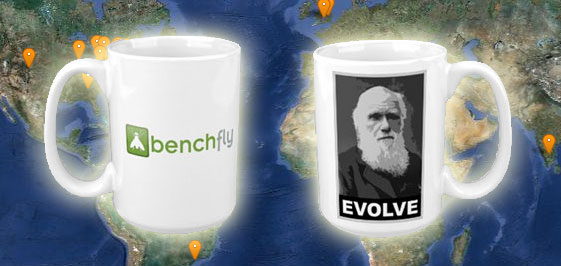How is a Dormouse Like a Career Scientist?
by
 No it’s not predation by large owls, it’s strategic reproduction.
No it’s not predation by large owls, it’s strategic reproduction.
As anyone in academia knows, when to start a family is a really tricky decision. If you follow the traditional career path from college (4 years), to grad school (5-7 years), through a postdoc (3-6 years), perhaps another postdoc (3-6 years), into a tenure track position (5 years) which finally leads to a tenured faculty job (eternal) there really is no “good time” to pop out a baby or two.
After all, us mammals tend to reproduce at a time when we can ensure the survival of our offspring and ourselves, so we like to do so when there are plentiful supplies of food and water (and money), as well as reduced stresses such as predation or grant deadlines. While humans are not seasonal, the academic career is. There’s no way you want to have a baby while you prep for your qualifying exam, or get that paper submitted, or defend your thesis, or go on a gazillion post-doc interviews, or try to get that fellowship funded, or compete for tenure… Not to mention the fact that scientists have little to no financial security until they are tenured, a position few reach before the age of 40, at which point fertility can become a serious issue.
So what’s a baby-crazy scientist supposed to do?
In a recent paper published in Oecologia, Claudia Bieber and colleagues found that common dormice in Lithuania reproduce only once or twice a year, and the timing of these two litters was specific. The first peak in birth rate occurred in June, soon after the mice finished their hibernation period. Birth rate then dropped dramatically in July, only to rise again in late August, shortly before the mice returned to hibernation.
Having babies is a physical stress to the mother, but she in turn has to weigh her own discomfort against the survival of her offspring. Dormice often wait until their favorite diet of fruits and seeds are abundant in the late summer to have their first and only litter of pups. This allows the mother to fatten and provide rich and nutritious milk. It doesn’t, however, give her babies much chance to gain the fat stores they need to hibernate. On the other hand, if the mother can have her pups earlier in the year, she gives them a much greater chance of fattening up and surviving the winter.

Dormouse = Grad Student
But, as with all things in life, it gets more complicated than that when you take into account those pesky Tawny owls. In Lithuania, dormice make up almost 10% of their diet, thus posing a pretty serious threat to these little rodents. Indeed, dormouse life expectancy is much higher during hibernation than in the summer months, a factor that seems to play into the bimodal distribution of dormouse births; a pup born shortly before hibernation is much more likely to make it to sexual maturity than one born at the beginning of the active season.
So it is the balance between body mass and owl-attack-survival that appears to drive the reproductive strategy of the common dormouse. Is the same true for scientists?
In my cursory survey of the MCB department here at Brown, most people seem to have their babies while they’re post docs. While their job is temporary, the pay is better than a grad student stipend, and, in their late-twenties or early-thirties, it makes biological sense. So, if grad school and tenure track employment represent periods of hibernation, or sexual inactivity, then perhaps the postdoc represents a happy breeding season? A hypothesis to be tested, perhaps…
.
Katie Pratt is a graduate student in Molecular Biology at Brown University. She has a passion for science communication, and in an attempt to bring hardcore biology and medicine to everyone, she blogs jargon-free at www.katiephd.com. Follow her escapades in the lab and online on Twitter.
.
Be the first one to mind the gap by filling in the location as a comment and get your name in the blog along with a sweet new BenchFly mug!
UPDATE: Congratulations to Aaron – winner of this week’s Mind the Gap!
 About the winner: Aaron is a post-doctoral fellow at the University of Michigan studying brain circuits involved in food intake and metabolism. He’s also a self-professed running junky, an amateur nutritionist and a coffee addict. You can keep up with the latest from him on Twitter or Facebook.
About the winner: Aaron is a post-doctoral fellow at the University of Michigan studying brain circuits involved in food intake and metabolism. He’s also a self-professed running junky, an amateur nutritionist and a coffee addict. You can keep up with the latest from him on Twitter or Facebook.
About the prize: In addition to fame and glory beyond their wildest dreams, winners receive our new hot-off-the-presses large (15 oz) BenchFly mug to help quench their unending thirst for scientific knowledge… or coffee. Check out where the mug has traveled – will you be the first in your state or country to win one?
Miss a previous edition of Mind the Gap? Shame on you! Don’t worry – we’ve got you covered:
With Great Power Comes Great Violin Strings
All the Better to See Sperm Whales With, My Dear
Saw VII: The Revenge of the Sawfish
Caution: Objects May Appear Larger Than They Really Are
Facebook Updates: The Good, The Bad, and The Vague
Scared of Dropping the Soap? Worry No More.
A Social Network for Food: Why Won’t Vanilla Friend Garlic?
I’d Rather Die Fat and Young than Old and Skinny
Look Into My Wide, Vacant, Eyes
Sweet Relief: How Sugar May Help Reverse Climate Change



Aaron
wrote on May 3, 2012 at 2:10 pm
Tawny owl for sure.
Aaron
wrote on May 3, 2012 at 2:14 pm
…as far as the country goes, I'll go with Serbia.
alan@benchfly
wrote on May 3, 2012 at 2:18 pm
close! You're on the right continent…
Aaron
wrote on May 3, 2012 at 2:24 pm
…or a bit more north. My final answer is Lithuania (not that this is Jeopardy or anything).
alan@benchfly
wrote on May 3, 2012 at 2:27 pm
We've got ourselves a winner!
DMB
wrote on May 3, 2012 at 2:24 pm
Lithuania
@jrmontag
wrote on May 3, 2012 at 2:26 pm
Lithuania.
InBabyAttachMode
wrote on May 3, 2012 at 2:59 pm
I had a baby during my postdoc, so my n=1 would prove your hypothesis. 2 babies on the other hand are probably a bit too expensive to send to daycare on my postdoc salary…..